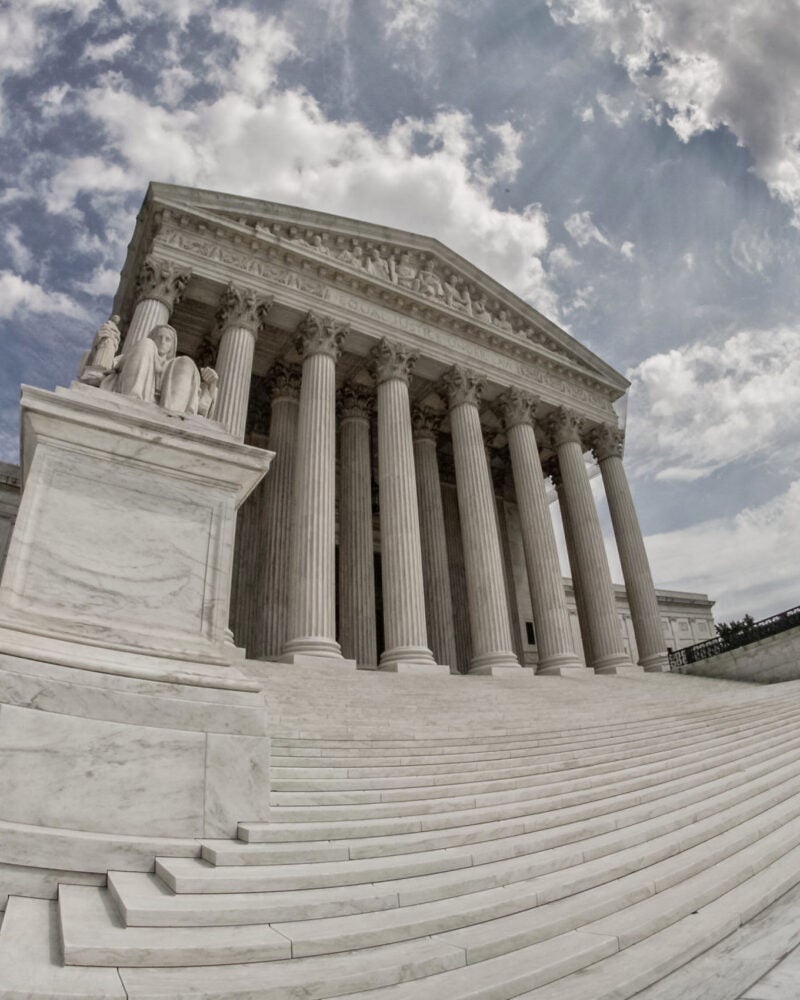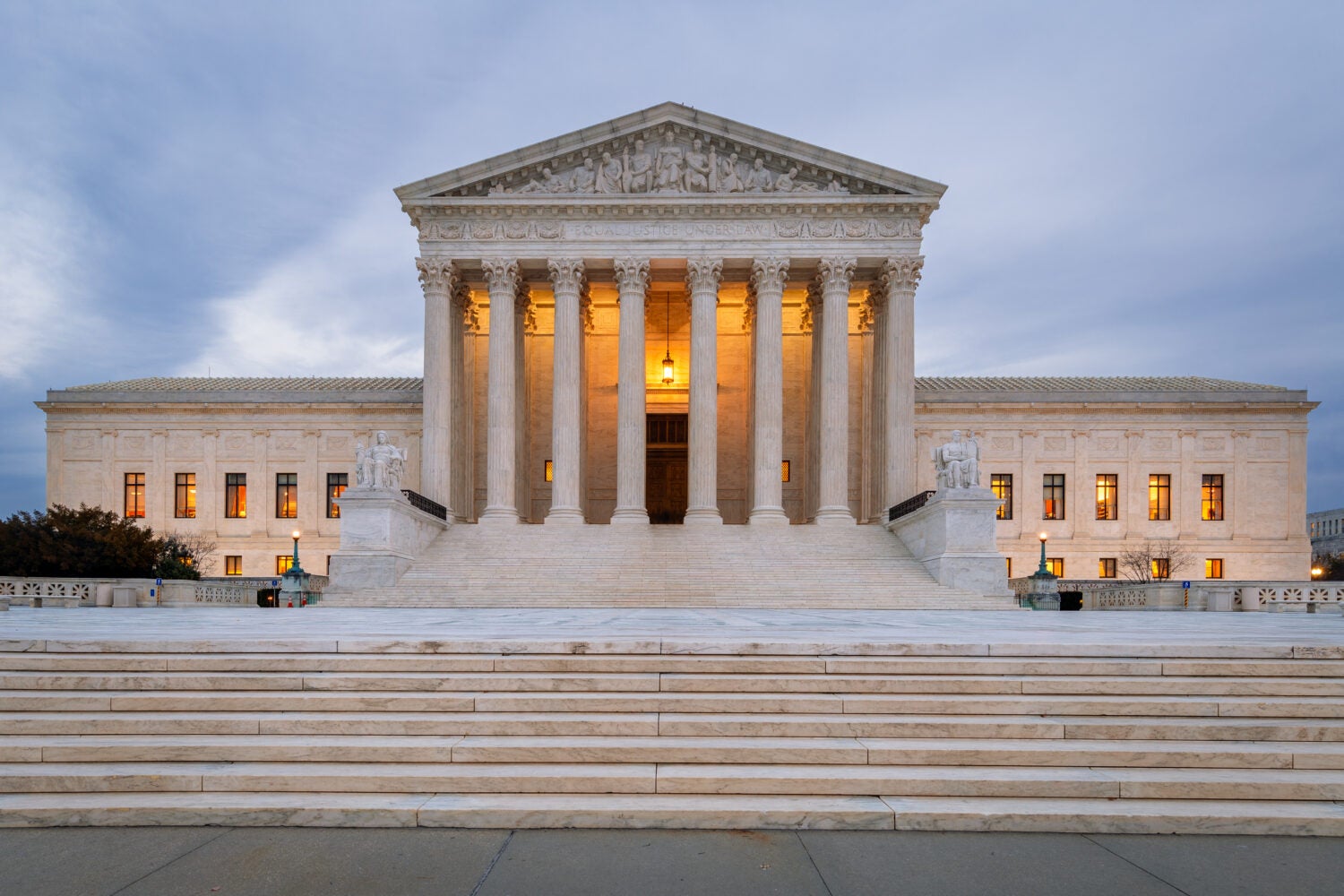W
hen it comes to the Supreme Court’s place in American law, democracy, and culture, this past year has been the most momentous in at least half a century. The Court’s decisions on abortion rights, gun rights, religious rights, and the role of the administrative state have fundamentally reshaped the way many understand the Court’s place in the existing constitutional order. The Court’s decisions this past year must also be viewed in light of its decisions in previous years on voting rights and political gerrymandering and decisions anticipated this Term on affirmative action and, once again, voting rights and elections. This yearlong lecture series will bring together leading academics, journalists, and jurists from the U.S. and abroad together to examine the appropriate role of the U.S. Supreme Court in a constitutional democracy.
The fall installments of the series will focus on the following topics: To what extent has the current court become primarily a political rather than a legal institution (“Law and Politics in the Roberts Court”)? Is stare decisis still a meaningful constraint on Supreme Court judicial decision making, if it ever was (“Stare Decisis and the Roberts Court”)? As a constitutional and political matter, are changes to the Court necessary, if so, what changes to the court’s structure are possible, and would they make a meaningful difference (“Reforming the Court”). We will also offer additional installments in the Spring term.
Law and Politics in the Roberts Court
Monday, September 19, 12:30-1:30 PM
What is the relationship between law and politics in the Supreme Court? And has it changed in our current moment? Does the Roberts Court break from prior judicial understandings or popular expectations about the role of law and of politics in judicial review? Do changes in American politics over time help us to better understand the current moment? And should the relationship between law and politics in the Roberts Court affect how we think about the power of the judiciary more broadly? Join us in exploring such questions with leading voices from a range of perspectives including legal academia, political science, civil rights advocacy, and journalism.
Moderator:
Daphna Renan, Peter B. Munroe and Mary J. Munroe Professor of Law
Panelists:
William Baude, Professor of Law & Faculty Director of the Constitutional Law Institute, University of Chicago Law School
Amanda Hollis-Brusky, Professor of Politics & Chair of the Politics Department, Pomona College
Adam Liptak, Supreme Court correspondent, The New York Times
Leah Litman, Professor of Law, University of Michigan Law School
Janai Nelson, President and Director-Counsel, the NAACP Legal Defense Fund
Stare Decisis and the Roberts Court
Monday October 3, 12:30-1:30 PM
The doctrine of stare decisis is deeply contested in the Roberts Court. Although all of the Justices articulate their commitment to stare decisis, some commentators describe the actual force of the doctrine as vanishingly weak in the Supreme Court. Others believe that the doctrine expands rather than constrains judicial discretion by allowing the Justices to adhere even to mistaken precedents that they like while leaving them free to jettison precedents, such as Roe v. Wade, of which they disapprove. This distinguished panel will address both positive questions involving the role that stare decisis plays in the Supreme Court today and normative questions concerning the constraining force, if any, that the doctrine ought to exert.
Moderator:
Richard Fallon, Story Professor of Law, Harvard Law School
Panelists:
Michael Dreeben, former Deputy Solicitor General of the United States, Distinguished Lecturer at Georgetown Law, and partner at partner at O’Melveny & Myers
James Gibson, Sidney W. Souers Professor of Government, Washington University in St. Louis
Tara Grove, the Vinson & Elkins Chair in Law, University of Texas School of Law
Darren Hutchinson, Professor of Law and John Lewis Chair for Civil Rights and Social Justice; Director of Community and Inclusion; Chief Diversity Officer
Kimberly Robinson, Supreme Court Reporter, Bloomberg BNA
Reforming the Supreme Court
Wednesday, November 9, 12:30-1:30 PM
Does the Supreme Court need reform? If so, of what kind? The past few years have seen renewed calls for court reform, with proposals ranging from adding new Justices to limiting their terms to reshaping the Court’s jurisdiction. Why has the issue come to the fore now, and what reasons are there for or against the proposed reforms? This panel of experts will discuss the experience of the recent Presidential Commission on the Supreme Court of the United States, along with proposed changes to the Court’s membership, structure, and powers.
Moderator:
Stephen Sachs – Antonin Scalia Professor of Law, Harvard Law School
Panelists:
Rosalind Dixon – Professor, UNSW Sydney
Richard Re – Joel B. Piassick Research Professor of Law, University of Virginia, School of Law
Cristina Rodriguez – Leighton Homer Surbeck Professor of Law and Counselor to the Dean, Yale Law School
Maya Sen – Professor of Public Policy, Harvard Kennedy School
Neil Siegel – David W. Ichel Professor of Law and Professor of Political Science, Duke Law
Teaching the Roberts Court: Challenges, Opportunities, and Strategies
Monday, March 20, 12:30-1:45 PM
In its most recent years the Supreme Court has decided cases that have reached new understandings of fundamental constitutional rights (Dobbs, Bruen), put pressure on the administrative state (the major questions doctrine) and otherwise deeply changed our understanding of the law. Does this court and its decisions require a starkly different approach to how law is taught in classrooms? Should law professors continue to emphasize doctrine? Or should they emphasize the realpolitik of judicial decision-making? Should the case method give way to more teaching about organizing or lobbying? What should law schools and legal pedagogy look like in response to the Court’s most recent phase?
Moderator:
Jeannie Suk Gersen, John H. Watson, Jr. Professor of Law at Harvard Law School
Panelists:
Randy Barnett, Patrick Hotung Professor of Constitutional Law, Georgetown Law
Robert Chang, Executive Director, Fred T. Korematsu Center for Law and Equality and Professor of Law, Seattle University School of Law
Olatunde Johnson, Ruth Bader Ginsburg ’59 Professor of Law, Columbia Law School
Michele Bratcher Goodwin, Chancellor’s Professor of Law , UC Irvine Law; Abraham Pinanski Visiting Professor of Law, Harvard Law School
Maggie Lemos, Robert G. Seaks LL.B. ’34 Professor of Law, Duke Law

Lecture Series Organizers
• Guy-Uriel Charles, Charles Ogletree, Jr. Professor of Law
• Glenn Cohen, James A. Attwood and Leslie Williams Professor of Law; Deputy Dean; Faculty Director, Petrie-Flom Center for Health Law Policy, Biotechnology & Bioethics
• Richard Fallon, Story Professor of Law
• Noah Feldman, Felix Frankfurter Professor of Law; Director, Julis-Rabinowitz Program on Jewish and Israeli Law
• Daphna Renan, Peter B. Munroe and Mary J. Munroe Professor of Law
• Stephen Sachs, Antonin Scalia Professor of Law
